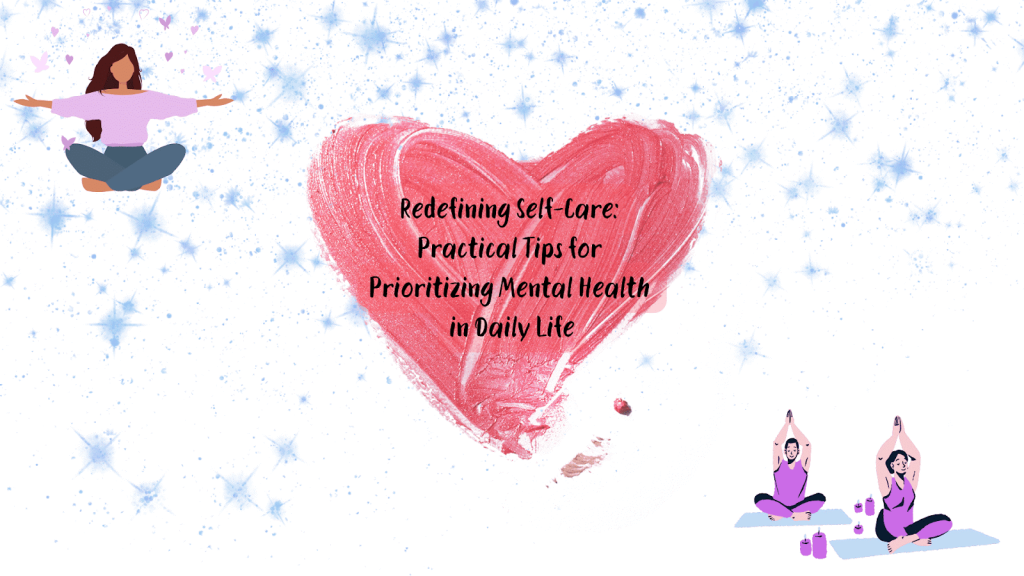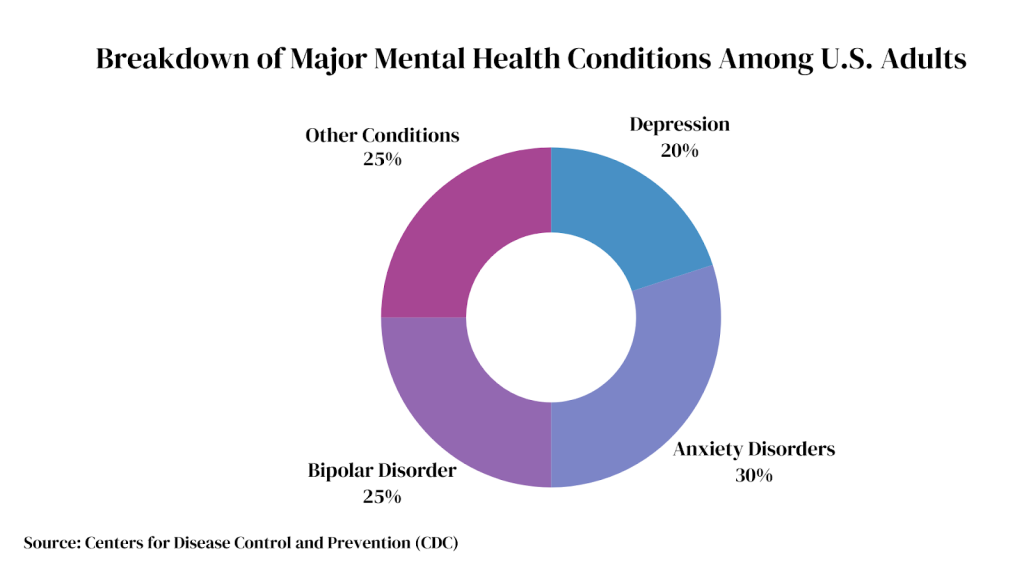When was the last time you truly relaxed and recharged? If your most personal needs often end up at the bottom of an endless to-do list. Work, family, responsibilities – Our plates are often piled high as we rush through demanding days. But we can’t care for others without caring for ourselves first. Self-care is not selfish. In fact, nurturing our mental health allows us to positively contribute more to those we love.
This article provides realistic tips to refresh your self-care approach with daily wellness habits. Making small choices to relax your mind can significantly improve your ability to be resilient in the face of life’s stresses. Learning to integrate self-care equips you to handle challenges while living with greater balance and joy.
The Evolution of Self-Care
The traditional notion of self-care focuses narrowly on caring for our physical bodies through nutrition, exercise, and sleep. However, in recent years the understanding of self-care has evolved to also prioritize mental and emotional health. According to the World Health Organization, integrating mental wellness strategies into self-care routines can be highly effective and affordable. The WHO advocates for prevention programs and interventions that promote mental health, highlighting the need to expand the definition of self-care beyond just physical fitness and diet.
Mental health issues like depression, anxiety, and even addictions such as opioids addiction are urgent public health concerns, emphasizing the importance of caring for our minds as much as our bodies. Broadening the lens of self-care allows us to develop holistic routines that nourish the full spectrum of our well-being – including our mental health. As the WHO states, both physical and mental health promotion strategies are feasible, low-cost interventions. Evolving our understanding of self-care empowers us to care for both the mind and body in our daily routines.

Understanding the Pillars of Mental Health
Mental health and wellness depend on the complex interplay of several key components. According to frameworks provided by the World Health Organization, there are three foundational pillars that support overall mental well-being:
| Pillar |
Description |
| Emotional Wellbeing |
Ability to cope with life stresses and regulate emotions in a healthy way. Includes resilience. |
| Psychological Wellbeing |
Having a positive self-image, sense of meaning and purpose, and capacity for growth. |
| Social Wellbeing |
Building meaningful relationships and having a sense of connection to the community. |
Mental wellness requires care across emotional, psychological, and social dimensions. From regulating emotions to fostering personal growth, these pillars deeply influence our daily mood, self-image, relationships, and overall well-being.
Mental health does not have a single cause or solution. It is determined by a complex interaction of internal thoughts and behaviors with external stressors, relationships, and community forces. Caring for all three pillars of mental wellness is essential for complete health, underscoring the need for holistic self-care strategies.
Practical Strategies for Mental Health and Self-Care
Once we understand the pillars upholding mental wellness, we can take action to care for them through practical self-care strategies. Here are evidence-based tips to integrate mental health care into daily life across emotional, psychological, and social dimensions.
Routine Reevaluation
Our mental health needs vary from day to day. Creating a flexible routine allows us to adjust activities and rest periods as needed to nourish our well-being. The WHO advocates for integrated, community-based care that meets individuals’ needs and promotes mental wellness.
- Evaluate your routine regularly and make changes to adapt to your current mental health state. For example, if you are feeling burdened, add in a relaxing activity like reading or meditating. If you are feeling unmotivated, plan a fun physical activity to boost endorphins. Customize your routine based on how you are feeling.
- Don’t be afraid to say no to work and social obligations that drain you right now. Protect your time and energy for self-care.
- Use productivity tools to build flexibility – make daily to-do lists rather than rigid schedules so you can adapt as needed.
- Communicate your needs clearly to family, friends, and coworkers. Let them know you are prioritizing mental health right now, so they understand if you decline invitations or shift plans.
Routines provide stability but should flex to meet your changing needs. Regularly reassess and adjust your daily routine to support your mental wellness.
Mindfulness and Meditation
Mindfulness practices help strengthen emotional well-being by teaching us to stay grounded and focused in the present moment. Studies show mindfulness can reduce stress, improve mood and anxiety, and enhance self-awareness of emotions.
- Try 5-10 minutes per day of meditation using apps like Calm, Headspace, InsightTimer. Focus on your breath, visualization or mantra repetition.
- If sitting still is challenging, try walking meditation outside. Pay close attention to the sensations of walking.
- Yoga combines physical movement with breathwork and mindful presence. Even 10-15 minutes a day can reduce stress.
- Practice mindful eating by noticing textures, flavors, and sensations without distractions. Turn off screens and focus on your food.
- Take mindful breaks during the day to check in with yourself. Notice how you feel emotionally and physically in that moment.
Regular mindfulness exercises strengthen emotional well-being by teaching skills for healthy stress management and emotional regulation.
Physical Activity
Physical activity powerfully supports both physical and mental health. Regular exercise is linked to a lower risk of anxiety, depression, and improved self-esteem and cognitive function.
- Aim for 150 minutes per week of moderate exercise like brisk walking, dancing, gentle cycling, or yoga. Break it into manageable daily chunks.
- Try energizing start-your-day workouts or de-stressing evening routines to build mental health benefits.
- Boost motivation by exercising with others virtually or in person. Join an online class through sites like Obé Fitness.
- Take regular 5-10 minute movement breaks when feeling stagnant – do stretching, take a walk, dance to favorite music.
- Track your activity with a wearable device or phone app to stay on top of your movement goals. Celebrate fitness milestones.
Regular physical activity supports psychological well-being by naturally boosting mood, fostering a sense of accomplishment, and enhancing embodiment.
Nutrition
Diet significantly influences our mental health. A nutritious, balanced diet provides steady energy and stabilizes mood. Some tips:
- Eat more vegetables, fruits, whole grains, beans, lentils, nuts, and seeds for sustained mental focus and calm.
- Limit sugar, refined carbs, processed foods, and fried foods which can cause energy crashes.
- Stay hydrated with water and unsweetened drinks to avoid dehydration headaches.
- Take a daily multivitamin to ensure you get sufficient B vitamins, iron, magnesium, and zinc, which boost mental function.
- Eat more anti-inflammatory foods like fatty fish, berries, leafy greens to support brain and mental health.
Nourishing your nutritional needs supports the mind-body connection critical for emotional and psychological wellness.
Digital Detoxing
While technology has benefits, constant digital stimulation overwhelms the mind. Practicing screen-free time improves mental clarity and focus.
- Set boundaries around devices – turn off notifications, and put phones away during meals, meetings, or time with loved ones.
- Take regular social media breaks for 1-2 days at a time. Unplug completely on vacations.
- Spend more time outdoors enjoying nature without technology to give the brain a break.
- Do activities that limit digital distraction – reading, journaling, drawing, puzzles.
- Replace mindless scrolling with active hobbies – gardening, learning an instrument, crafting.
Limiting technology overload helps the mind recharge, improving concentration, emotional regulation, and a sense of purpose.
Sleep Hygiene
Sleep is foundational for both physical and mental health. Lack of quality sleep increases the risk of mood disorders, cognitive decline, and burnout. Some sleep hygiene tips:
- Keep a consistent sleep routine of 7-9 hours nightly for your optimal duration.
- Avoid stimulating screens before bed – turn off TVs, phones, and laptops 1-2 hours before bedtime.
- Make the room cool, dark, and quiet – use a sleep mask, blackout curtains, and a white noise app.
- Take relaxing sleep aids like chamomile tea, CBD oil, and magnesium supplements as needed.
- Establish a calming pre-bed routine like gentle yoga, reading, or meditation.
Improving sleep hygiene sustains emotional resilience, brain function, and performance the next day. Prioritize rest for mental health.
By taking a holistic approach across these pillars of well-being, we can integrate mental health care into our daily self-care regimens. Be patient as you build lasting habits for a balanced, mindful lifestyle.
| Strategy |
Key Benefits |
Tips |
| Routine Reevaluation |
Adapts routine to changing needs and improves flexibility |
Evaluate and adjust routine regularly; communicate needs clearly |
| Mindfulness & Meditation |
Reduces stress and builds emotional regulation |
5-10 min daily meditation, mindful breathing, walking meditation |
| Physical Activity |
Boosts mood, self-esteem, focus |
150 min/week moderate activity, daily movement breaks |
| Nutrition |
Stabilizes mood and sustains energy |
Limit sugar/processed foods; eat more veggies/fruits/whole grains |
| Digital Detoxing |
Allows mental recharge and improves focus |
Take regular tech breaks and set device boundaries |
| Sleep Hygiene |
Supports emotional resilience and brain function |
7-9 hour routine, limit pre-bed screens, relaxation rituals |
Setting Boundaries for Improved Mental Health
To uphold mental wellness routines, set clear boundaries around your time and energy. Studies show boundary setting reduces work-life conflict and burnout. Communicate limits assertively. Say no to unnecessary obligations.
Prioritize must-do activities first before agreeing to extra tasks. Learn to say “Let me check my schedule and get back to you.” Block off non-negotiable self-care time on your calendar, like an important meeting and treat yourself as a priority. Practice saying no confidently and politely. Offer alternatives like “I can’t meet today but could next Tuesday.”
Turn off non-urgent notifications outside working hours to maintain boundaries. If you say yes to a request, assess if you need to rebalance by removing something else.Healthy boundaries protect your time and mental space. Assert your needs firmly yet kindly.
Seeking Professional Help
Seeking mental health support is courageous self-care. Counseling provides tools for improving emotional and psychological well-being that self-help alone cannot.
If self-care is no longer managing stress, anxiety, or emotional struggles, seek support. Don’t wait until you’re overwhelmed. Look for providers specializing in your needs, like anxiety, depression, trauma, and relationship issues. Commit to finding the right therapist fit. It may take a few tries but is worth it. You don’t have to struggle alone. Seeking professional help builds resilience.
Community and Support Systems
Our mental health is interdependent with that of our loved ones. Nurture social connections that feel energizing and mutually supportive. Spend meaningful time with family and friends who uplift you. Set regular dates. Join clubs, volunteer groups, or classes to expand your social circle. If certain relationships feel draining, set boundaries or limit interactions.
Reduce social media use if it causes comparisons. Spend time in nature and participate in spiritual practices that provide comfort. Confide in supportive loved ones during tough times and provide a listening ear to them as well. Practice vulnerability. Human connection, nature, and spirituality contribute to building a supportive community for mental well-being.
The Path to Holistic Wellness
Self-care means something different to everyone, but at its core is a commitment to nurturing our minds and bodies. In this age of constant stimulation and demands, it’s no surprise that so many of us feel overloaded, drained, and in search of relief. Yet taking intentional time to restore balance yields immense benefits, improving not just mental health but overall health and quality of life.
This is why experts advocate practical self-care strategies as a basic daily requirement, not a luxury. Easy habits like mindful breathing, journaling gratitude, going for a walk, or having an inspiring conversation can profoundly impact wellbeing. Let’s explore realistic ways to integrate self-care so it uplifts us every day.
Frequently Asked Questions
How can I find time for mental health self-care with a busy schedule?
Even with packed schedules, identifying small windows for self-care like 5-minute meditation or walk breaks can make a difference. Saying no to draining obligations frees up time to focus on your mental health. Schedule this as non-negotiable.
Can small routine adjustments really improve my mental health?
Absolutely. Just 5-10 daily minutes on simple self-care activities like mindfulness, journaling, and gentle exercise compounds over time, lowering anxiety and stress while improving mood.
What are signs I should seek professional mental health support?
Seek counseling if self-care isn’t helping with persistent sadness/anxiety, withdrawal from relationships, difficulty with daily tasks, appetite/sleep changes, or constant exhaustion and lack of enjoyment. Professional support helps when struggles become overwhelming.



